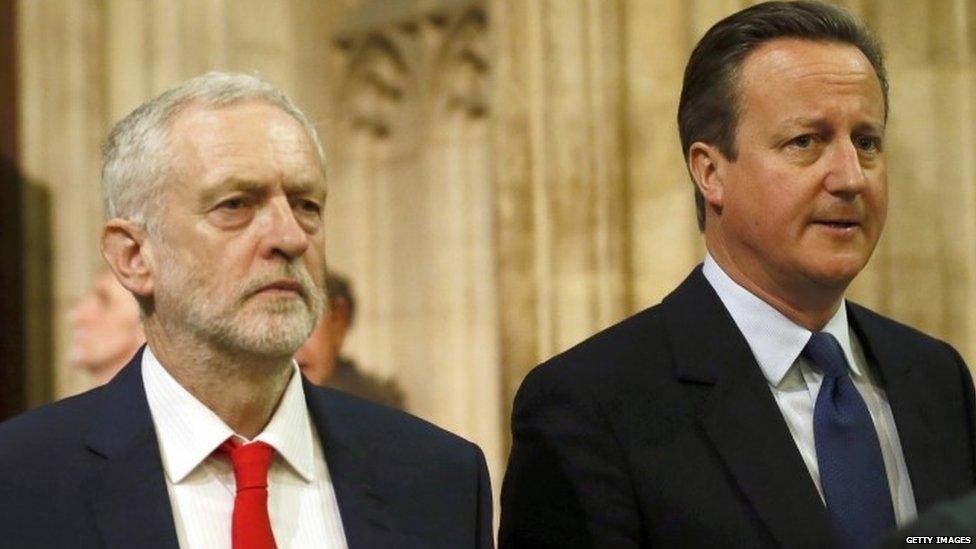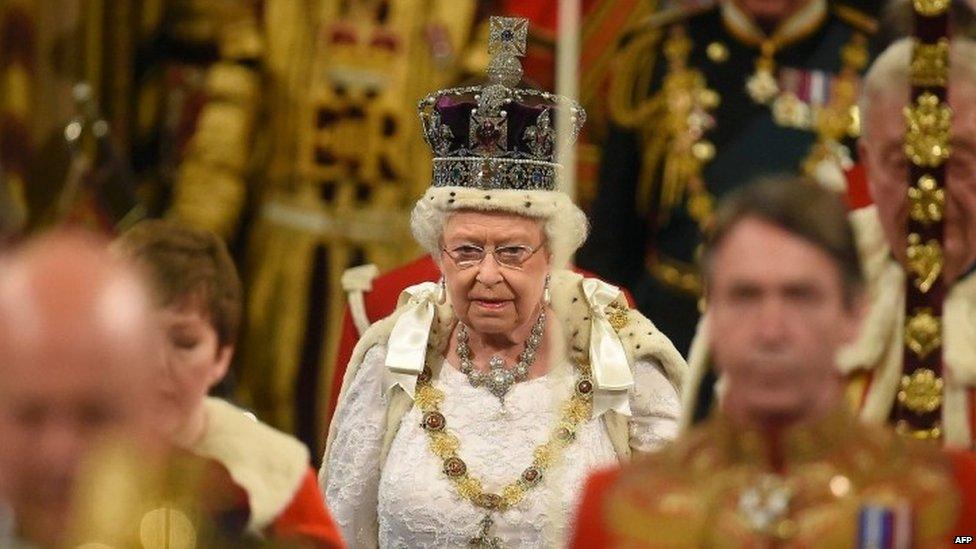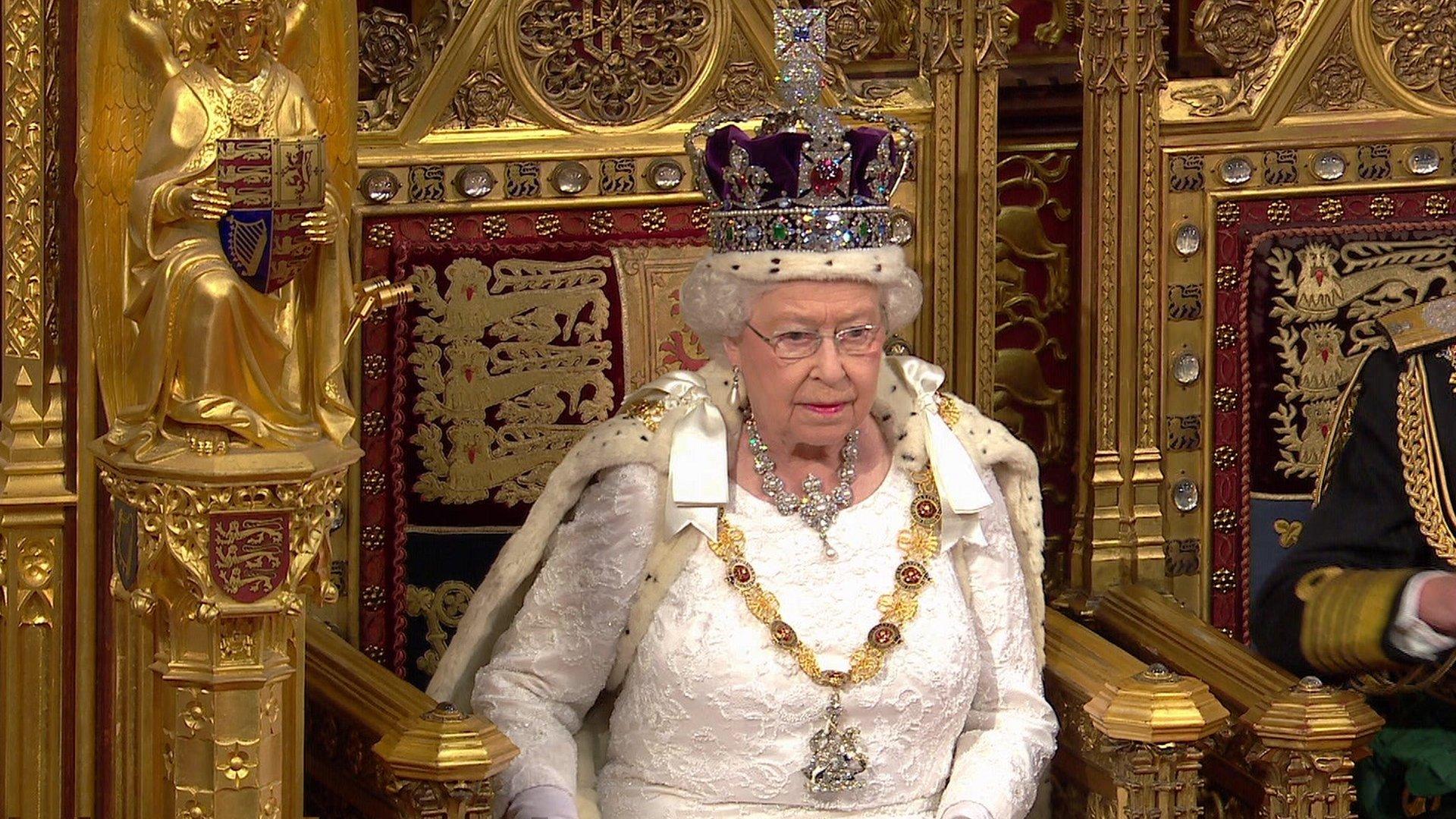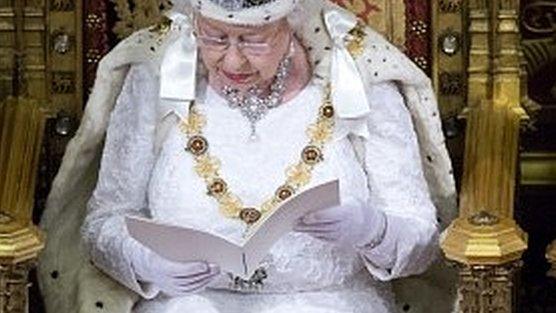Queen's Speech: EU vote awkward backdrop to PM's plans
- Published

The government has a small majority and has already had to drop a number of policies in the face of Labour and internal opposition
So Parliament's show of the year is here - the full regalia of state has seen Westminster bursting into colour.
The Queen's Diamond Jubilee state coach made its way to the Palace of Westminster carrying the Imperial State Crown before both houses came together for her speech.
It is a moment when the unity of state is on very purposeful display.
But after the gilded regalia is gone and the red carpets are stripped away a more prosaic political reality returns.
Her Majesty's Government is drawn from a party with a small majority locked into public division over an EU referendum with the potential to decide the fate of her prime minister and members of the cabinet.
'Bold reforms'
In press released comments to accompany the speech, David Cameron said the government's legislative programme involved "difficult choices" and "big and bold reforms".
But those reforms are likely to be a little less difficult and perhaps a touch smaller and less bold than they might otherwise be - because the wrong referendum result has the potential to terminate the prime minister's oversight of all of them.
This is a moment when Mr Cameron can ill afford controversies over planned legislation or public spats with his own backbenchers threatening to rebel over upcoming bills.

The Queen's Speech comprises more than 20 bills
It is striking that some of the most heavily trailed parts of the Queen's Speech are those that have the effect of promoting the government's desire to be seen as compassionate.
The programme sees legislation introduced "to tackle some of the deepest social problems in society, and improve life chances".
The planned laws involve changes to adoption and social work designed to lift children out of poverty and prison reform for "changed and reformed lives" for offenders.
The prominence given to these announcements follows a series of damaging climb downs in which critics accused ministers of having to be forced to take the compassionate argument in the face of threatened backbench rebellions.
Bill of Rights
Take the recent changes of heart by the government - which has a working majority of just 17 - over housing child refugees from Europe or over planned welfare cuts for the disabled.
The latter involved the resignation of Work and Pensions Secretary Iain Duncan Smith, who after a fierce battle with the Treasury left behind him excoriating comments suggesting the government had lost its way in helping the poorest.
Of course, Mr Duncan Smith - who opposes Britain's membership of the EU - leads us back to the prime minister's bigger battle - the referendum. The campaign has split the Conservative Party and is becoming increasingly embittered with rows having the potential to bleed through into other areas of policymaking.
The government's plans for a "British" Bill of Rights is one such area likely to become a battleground for the competing sides in the EU debate.
The proposal formed a meagre eleven words towards the end of the Queen's Speech with little additional detail from the government - other than to say the rights would be based on those set out in the European Convention on Human Rights (ECHR), while taking into account UK laws. The lack of detail may help avoid a potentially explosive row over the bill - for now.
But Mr Duncan Smith has attacked David Cameron for abandoning other key legislation, citing a failure to include a planned Sovereignty Bill to re-assert the supremacy of the UK Parliament.
It is another sign of how hard it can be during the campaign to disentangle the usual process of government from the deepening divisions over the referendum.
'Not distracted'
But despite the challenges for the government, the speech does contain some striking and potentially controversial measures.
Proposals to privatise the Land Registry will provoke a fierce response from unions, which have already raised concerns over thousands of jobs.
The Counter-Extremism and Safeguarding Bill includes stronger powers to disrupt radicals' activities and is likely to provoke strong debate.
The Prison and Courts Reform Bill gives new powers to prison governors to control their own jails, which the government claims is the "biggest reform of our prisons since Victorian times".
The former Home Secretary Michael Howard says all this shows the government "is not distracted by the referendum". That's despite his own opposition to the government's position on remaining within the EU.
These are awkward times indeed for the government - but ones from which attention is deflected for one morning only, thanks to the gleaming regalia of the Queen's Speech.
- Published18 May 2016

- Published18 May 2016

- Published18 April 2016
